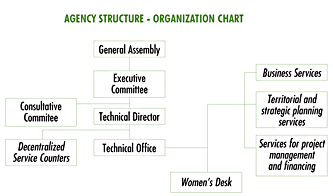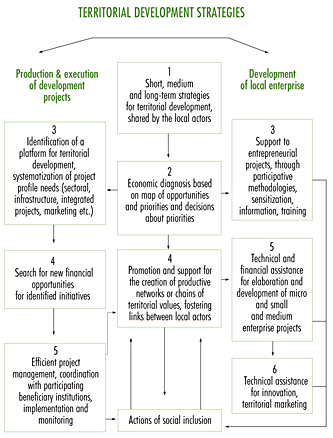Local Economic Development Agencies for governance and internationalization of local economies
Local Economic Development Agency in practice
Each LEDA develops its own model in terms of partnerships, organization, services, according to specific needs and demands, and socio-cultural and historical evolution. The common characteristics regarding ownership, organization, service delivery, operational models, and sustainability factors of the LEDA are the following.
THE OWNERS OF THE LEDA
All interested local actors with an active role in local development participate as members and owners of the LEDA: local administrations, decentralized institutions of ministries, productive associations, universities, banks and financial institutions, education and research centers, NGOs, private sector.
The 17 members of the Manica LEDA in Mozambique
- Municipal Council of Chimoio. It represents the 152,000 inhabitants of the provincial capital.
- Municipal Council of Catandica. It represents the 12,000 inhabitants of the city of Catandica.
- Municipal Council of Manica. It represents the 42,000 inhabitants of the city of Manica.
- Station Eva. Private agro-business enterprise with 42 woorkers.
- Mozambican Women’s Association, OMM. It represents 26000 women of the province, organised in “Circles of interest”.
- Farmers Association of Manica ASAM, with 60 members.
- Farmers Union of Manica UCAMA. Provincial trade union with 1500 members, of which 40% women, a National Union associate.
- Coordination Forum of the Associations of Manica FOCAMA. It includes 42 local associations of different sectors (women, envirnoment, workers).
- Farmers Association of the Manica District, which has 100 members.
- Development Fund of Small enterprise (FFPI). Financial institution for financing small businesses in rural areas.
- Metallurgia of Chimoio. Private metal company, producing goods and equipment for agro-businesses.
- Sport Club. Association of 60 young people of Chimoio, promoting sports acticvities in rural schools.
- Program for cultural activities PAC. Private Association, promoting local culture.
- Activa. Association of 160 women entrepreneurs.
- La Musica. Association for the promotion of women who are heads of familly in rural areas.
- Institute of Mozambican Cereals (ICM). Company for the commercialisation of cereals.
- Revue-Sagrev, private company for the transformation of seeds and the production of food oils.

TERRITORIAL COVERAGE
The operational area of an agency normally extends beyond the municipal territory, equivalent to the intermediate level of state decentralization. In fact, its territorial coverage has to meet requirements such as stable public-private relationships, within a geographical area equivalent to a decentralized administrative division of the state, the availability of a critical mass of resources for sustainable and competitive development, and the participation of the population in decision-making.
The majority of the LEDAs of the ART/ILS LEDA network cover a territory equivalent to a region or province (department, provinces, districts, according to the country), where, in fact, all the national government’s decentralised departments with an important role in economic development have a delegation or an office (agriculture, labour, public works, finance, etc.). In regions with a very large extension or where poor communication infrastructure impede effective coverage in more remote areas, the LEDA establishes decentralised offices to enable the population to participate and provide direct support.
Implementation of planning instruments
Teuleda, the Agency of the Region of Skodra (Albania), played a basic role in the strategic development plan of the Municipality of Skodra. The municipality of Skodra (112,000 inhabitant), in fact, has taken a leading role in the region for the implementation of a strategic development plan to promote economic transformation to a market economy (some nine-tenths of the former state-owned enterprises in the city were privatized).
Teuleda was given the committed the coordination of the LED commission, headed by the mayor, which involved 110 representatives of local governments, the business community, banks, educational institutions, public enterprises, NGOs, the university and local experts. The plan envisaged to:
- Exploit local economic resources, such as food processing, wood processing, artisan products industry, and tourism (religious, cultural, family);
- Develop an efficient system of communication between the municipality and its partners;
- Coordinate the activities of different organisations and agencies operating in the region.
- Promotion and support of SME: Information, technical assistance, training, loans, marketing.
- Local institutions support: Data archive, information, coordination among local institutions, technical assistance and training for 35 municipal officers.
- Territorial marketing: Data collection, publishing promotional documents, organization of promotional events.
- Internationalization: Missions abroad, promotional contacts with 93 public and private bodies, 7 International partnerships projects.
SUSTAINABILITY OF LEDAS AND THE CREDIT FUND
All the LEDAs in the ILS LEDA network are sustainable. This sustainability is guaranteed by several types of income, such as membership fees, sale of services to public and private territorial bodies, management fees related to the execution of contracts with partners or donors, payments from intermediation services; interest rates from the guarantee fund deposited in a bank.
The experience shows that in the initial five or six years of a LEDA, the income from the interests related to the credit fund represents 50-70% of the total revenue, project over-heads 20-40%, and the rest comes from services and fees. After this period, and according to the LEDA learning curve, the income from the credit activity decreases progressively to 30-40%, while sale of services and income from projects increases.
The availability of a fund for facilitating credit access for small entrepreneurs, farmers, cooperatives, and, generally, all the people without access to normal business financial channels, is very important. Several constraints, in fact, exist for these categories of people: lack of collaterals, lack of banking record, difficulty in accessing information on credit programmes and opportunities, complicated bureaucratic procedures, banks’ lack of confidence in client loan restitution.
It is, therefore, important that LEDAs have the capital to set up a credit fund, and sustain entrepreneurial activities. Generally, this capital is granted by international or national institutions and programmes. A “Guarantee fund”, created through an agreement with a local bank, covers the bank on the risk of not receiving back the loan, encourages the most disadvantaged people to make use of it, and often allows for the disbursement of credit two or three times the invested capital. According to these agreements, the LEDAs accomplish various tasks to minimise risks. They spread information about the possibility of receiving loans at special conditions; select business ideas which are most reliable and coherent with the territorial development strategies, and the objectives of sustainable and equitable development; support applicants in the preparation of business plans and bank bureaucratic procedures; provide loan request follow-up; provide technical assistance also after the client has received the loan; contribute to recovery, thanks to the large social involvement of the population in the agency. The 50 LEDA members of the ILS LEDA network registered a credit return rate above 90% in 15 years.
SERVICES PROVIDED BY THE LEDA
Each LEDA organizes the services that are needed by the population and by the institutions of the territory. The most common services offered by the LEDAs are the following:
Impact on the local economy produced by the different services of a LEDA
Territorial animation
- Elaboration of territorial diagnosis in order to identify economic potential and help in local strategic planning
- Support to local government designing strategies for economic development
- Promotion of a favorable climate for an entrepreneurial culture among inhabitants
- Promotion of the associations and productive groups networks
- Reinforcement of the role and the functions of territorial institutions
- Support to the most vulnerable population in the exploitation of economic opportunities
- Support to women empowerment
- Elaboration of technical and economic feasibility studies;[list]Organization of courses for technical, management and professional training
- Financial support to new or existing enterprises
- Support to local value chains
- Information system necessary for productive activities
- Promotion of innovation and technical exchange
Territorial promotion
- Territorial marketing
- Creation of databases of productive projects
- Project financing
- Realization of strategic projects for harmonic territorial economic development, involving local actors
- Promotion of the internationalization of the territory and international partnership projects
Impact on the local economy produced by the different services of a LEDA
The LEDA of the Department of Morazan in El Salvador, established in 1993, has a relevant impact on the territorial development, from the occupational, social, technological, and economic point of view. In the last five years, more than 2000 new jobs were created, almost 1000 were saved, half of which involved women. The LEDA created, in the same period, about 90 small enterprises (employing less than 5 persons), provided assistance for the survival and growth of 2000 small businesses, and disbursed credit worth 3,640,000 USD, which benefited 32,000 disadvantaged people. Three clusters of agro-industrial enterprises have been promoted and developed, one with 105 small enterprises, another one with 31, and the last with 62. These clusters contribute to the long term sustainability of the associated enterprises.
The Morazan LEDA reserves part of its own income for social initiatives: in the last five years 203 grants were given to students to support their university studies; 6400 disadvantaged people (2400 women) were empowered through capacity building; projects for disaster prevention were realized benefiting 4000 people; the cooperatives created benefit 1200 producers; 3500 producers participate in the Farmers Forum; 2400 persons participate in the project for institutional empowerment of municipalities.
The LEDA has implemented new advanced services for the community, such as the Geographic Information System (GIS), used by the local and national administration in planning, and established its own financial institution for improved management of credit operations for disadvantaged people.[/color]
THE WAY AN AGENCY OPERATES
An Agency operates through two general operational lines: development of local enterprises and fulfillment of projects coherent with the territorial development strategy.

DOWNLOAD THE BROCHURE PDF
Spanish (0.8 MB)English (0.9 MB)
French (0.9 MB)
ONLY TEXT
•Which problems do LEDAs solve?
•Local Economic Development Agency in practice








 COUNTRY OF ORIGIN
COUNTRY OF ORIGIN